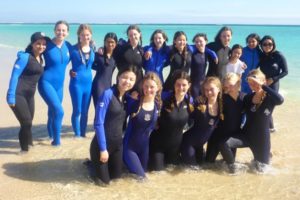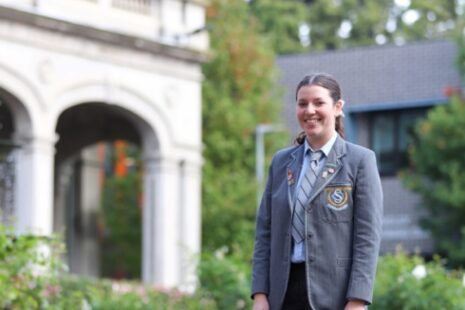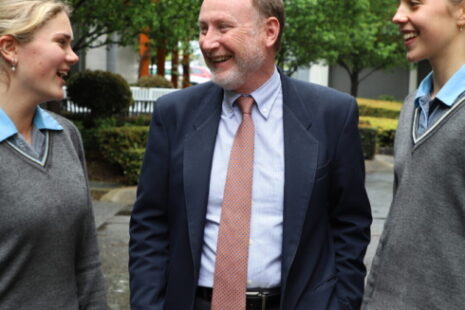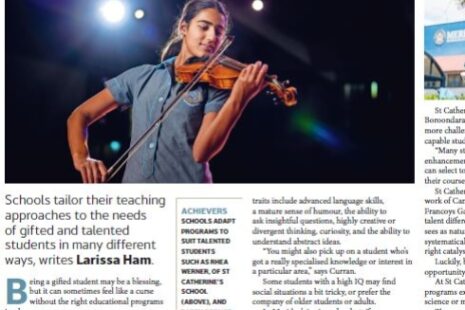A Magic Moment
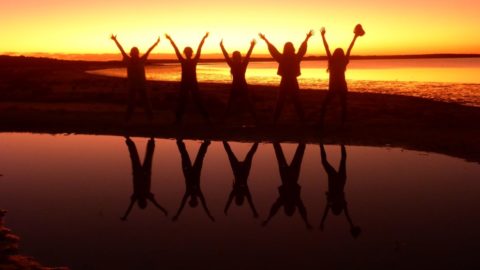
Last week I had a ‘magic moment’ with some students. From a teacher’s perspective, a ‘magic moment’ is where student and teacher are totally absorbed in the learning at hand and all other distractions surrounding us disappear.
The ‘magic moment’ I experienced took place with a group of Year 9 students on the far side of the country in Western Australia, at Ningaloo Reef to be precise. Ningaloo Reef and coast is a World Heritage site located on Western Australia’s remote coast along the East Indian Ocean. The reef system runs for approximately 250 kilometres along the coast near Exmouth. It is home to an exquisite range of corals and sea life including whale sharks. In addition, the landscape in this remote part of the country is truly spectacular.
My magic moment took place while we were snorkelling at a site called Turquoise Bay. The whole group spent the day enjoying the warm sunshine and taking turns to snorkel in small groups to experience the wonders of undersea life. While the first dive was quite beautiful with a range of corals and fish in abundance, we did not see any truly big aquatic animals. Most of the girls felt that one snorkel was enough for the day. However, a few girls were keen for another experience. Our two guides Lawrence and Jordie took us out to another area for the dive. Within fifty metres of the 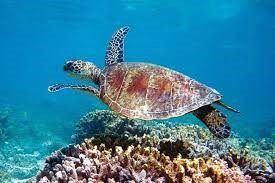 shore the coral was noticeably more abundant and diverse in the types and colours to be seen. Most striking was a blue coral which was home to thousands of fish swimming in and out of the ‘branches’ which they use for protection from predators. Much of the time the water was only chest deep but every now and again a little deeper. The sheer joy experienced by the girls was palpable. Every few metres there was a new fish to see, a different coral shape and much bigger fish including stingrays. Every now and again we would all surface, take the snorkels out of our mouths, and talk excitedly about what we were seeing. The girls could not get the words out quick enough such was the zeal they were experiencing. The only thing we had not seen was a turtle. Our guides did warn us not to get our hopes up for seeing this creature. Then, just as we were starting to head back to shore to end the dive, out of the blue, with all the grace and beauty of a creature at one with its environment, was a turtle.
shore the coral was noticeably more abundant and diverse in the types and colours to be seen. Most striking was a blue coral which was home to thousands of fish swimming in and out of the ‘branches’ which they use for protection from predators. Much of the time the water was only chest deep but every now and again a little deeper. The sheer joy experienced by the girls was palpable. Every few metres there was a new fish to see, a different coral shape and much bigger fish including stingrays. Every now and again we would all surface, take the snorkels out of our mouths, and talk excitedly about what we were seeing. The girls could not get the words out quick enough such was the zeal they were experiencing. The only thing we had not seen was a turtle. Our guides did warn us not to get our hopes up for seeing this creature. Then, just as we were starting to head back to shore to end the dive, out of the blue, with all the grace and beauty of a creature at one with its environment, was a turtle.
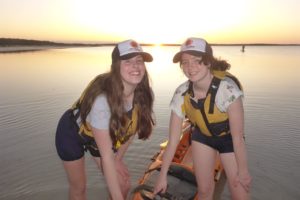 This delightful creature was oblivious to our presence. It just swam slowly past us in slow motion. Eagerly, we followed a little distance behind and within another few metres there was another turtle, also swimming effortlessly through the water. We followed and swam around the pair for the next ten minutes or so, hardly believing this spectacle was real. When we finally returned to the beach, we had to walk about 500 metres back to the rest of the group. Guess what we talked about? The discussion was not just about the turtles, but it moved on to the environment, the challenges in keeping this area pristine and of course, climate change was discussed. As we neared the other students, the girls who had been on the dive sprinted on ahead to share their experience with the others. When I finally caught up with them, you could not wipe the smile off their faces. This was a most special ‘magic moment’ which will remain in my memory and the girls forever.
This delightful creature was oblivious to our presence. It just swam slowly past us in slow motion. Eagerly, we followed a little distance behind and within another few metres there was another turtle, also swimming effortlessly through the water. We followed and swam around the pair for the next ten minutes or so, hardly believing this spectacle was real. When we finally returned to the beach, we had to walk about 500 metres back to the rest of the group. Guess what we talked about? The discussion was not just about the turtles, but it moved on to the environment, the challenges in keeping this area pristine and of course, climate change was discussed. As we neared the other students, the girls who had been on the dive sprinted on ahead to share their experience with the others. When I finally caught up with them, you could not wipe the smile off their faces. This was a most special ‘magic moment’ which will remain in my memory and the girls forever.
This was not the only memorable experience we had during our eight-day sojourn to the west. Notably, we spent three days with a local Indigenous man Uncle Capes, who shared his knowledge of culture and the unique environment of Francois Peron National Park which is close to Monkey Mia. For the girls and teachers, this experience presented an opportunity to connect with the natural world, gain greater insight into Indigenous culture and learn more about themselves, and each other. It was a chance to put down the textbooks for a period of time and appreciate the beauty and rejuvenation of the soul that a wild and unspoilt natural environments can bring to us.
A recent article in The Age on 13 July, For kids’ sake, we need to make amends written by Julie Szego, discussed the importance of students spending time away from school, engaged in experiential programs. Szego contends we are experiencing a “multifaceted angst of Generation X – including anxieties about our children in the aftermath of Melbourne’s singularly harsh lockdowns and the attendant immersion in social media, exacerbated an epidemic of isolation, self-loathing and obsessive disorders among young people.”
As parents and teachers, we have seen firsthand during the extended lockdowns over the last couple of years too many “children becoming listless and withdrawn. And it is a theme reflected in the statistics and expert reports showing lockdowns inflicted a disproportionate mental health burden on the young.” Szego resurrected an idea floated in 2010 by the State Labor Government where all 14-to-15-year olds would spend time away from school and home learning skills for adult life.
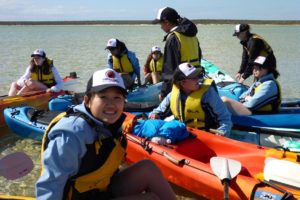 Experiential programs such as St Catherine’s Year 9 trip to Western Australia last week, can be transformative. These programs “amount to life, vividly experienced, and that’s usually fertile ground for personal growth.” In schools we can become overly obsessed with academic learning, subject scores, grades, and ATAR. Of course, these are important, but so too is playing in a sports team with teammates, singing in a choir with your friends or learning how to pitch a tent on the shore of a beautiful lagoon in a World Heritage area such as we did last week. Our co-curricular offerings at St Catherine’s and the range of experiential programs ensure we provide the essential balance of learning experiences so vital to becoming a well-rounded person.
Experiential programs such as St Catherine’s Year 9 trip to Western Australia last week, can be transformative. These programs “amount to life, vividly experienced, and that’s usually fertile ground for personal growth.” In schools we can become overly obsessed with academic learning, subject scores, grades, and ATAR. Of course, these are important, but so too is playing in a sports team with teammates, singing in a choir with your friends or learning how to pitch a tent on the shore of a beautiful lagoon in a World Heritage area such as we did last week. Our co-curricular offerings at St Catherine’s and the range of experiential programs ensure we provide the essential balance of learning experiences so vital to becoming a well-rounded person.
Last week I saw an opportunity for personal growth for our students in abundance. Whether it was setting up a tent, learning to cook on an open fire, helping to prepare dinner, sitting in a natural hot tub fed by an artesian bore at night, with the miracle of a starry sky above with no light pollution within 500 kilometres, paddling across a beautiful lagoon in a kayak, seeing sharks (safe ones!) in the wild and being up close to dolphins at Monkey Mia.
Travelling all the way to Western Australia was no guarantee that a ‘magical moment’ would take place. However, if you provide enough interesting and varied opportunities for our students, eventually it does happen. I was fortunate enough to be right in the middle of such a moment last week with those beautiful turtles and a few very enthralled girls. Was it magical? You bet it was!


